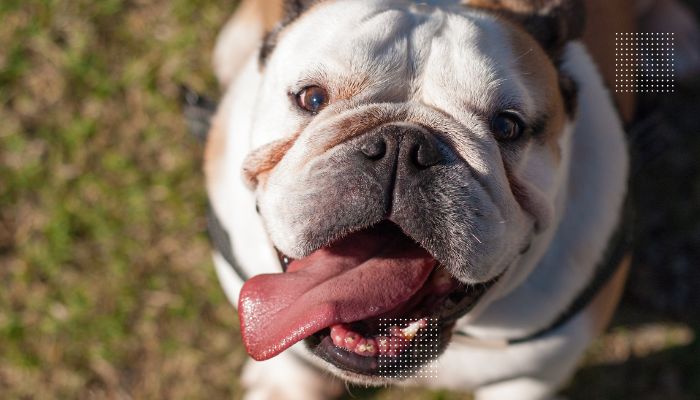It is not accurate to say that all bulldogs are aggressive. Like any breed of dog, individual bulldogs can have a range of temperaments, and some may be more aggressive than others. However, it is important to remember that all dogs, regardless of breed, can exhibit aggressive behavior if they are not trained and socialized properly.
It is the responsibility of the owner to provide proper training and socialization for their dog to ensure that it is well-behaved and does not display aggressive behavior.
There are a number of factors that can contribute to aggressive behavior in dogs, including genetics, early socialization experiences, and the way the dog has been trained and treated. If a bulldog is not socialized to other dogs and people at a young age, it may be more prone to aggressive behavior.
Similarly, if a bulldog is subjected to neglect, abuse, or other forms of mistreatment, it may become aggressive as a result.
In general, it is important to be aware of any aggressive tendencies in your dog and to address them through training and behavior modification.
If you are concerned about your bulldog’s aggressive behavior, it is a good idea to consult with a veterinarian or a professional dog trainer for guidance on how to manage it.

Table of Contents
Why are bulldogs so dangerous ?
It is not accurate to say that bulldogs are inherently dangerous. Here are some points to consider about the potential for aggressive behavior in bulldogs:
Like any breed of dog, individual bulldogs can have a range of temperaments, and some may be more aggressive than others.
All dogs, regardless of breed, have the potential to exhibit aggressive behavior if they are not trained and socialized properly.
Factors that can contribute to aggressive behavior in dogs include genetics, early socialization experiences, and the way the dog has been trained and treated.
If a bulldog is not socialized to other dogs and people at a young age, it may be more prone to aggressive behavior.
If a bulldog is subjected to neglect, abuse, or other forms of mistreatment, it may become aggressive as a result.
It is the responsibility of the owner to provide proper training and socialization for their dog to ensure that it is well-behaved and does not display aggressive behavior.
It is important to be aware of any aggressive tendencies in your dog and to address them through training and behavior modification.
If you are concerned about your bulldog’s aggressive behavior, it is a good idea to consult with a veterinarian or a professional dog trainer for guidance on how to manage it.
Why English Bulldogs Attack ?
English Bulldogs, like all dogs, can attack for a variety of reasons. Some common reasons for English Bulldogs to attack include fear, protectiveness, territorial behavior, and a lack of training or socialization. It is important to remember that all dogs have the potential to exhibit aggressive behavior and it is the responsibility of their owners to properly train and socialize their pets to prevent aggressive incidents.
It is important to remember that aggression in dogs is usually a learned behavior, rather than a natural instinct. Therefore, it is often the result of how a dog has been raised and trained. English Bulldogs, like all dogs, can be trained to be well-behaved and non-aggressive, but it is up to their owners to provide the necessary training and socialization.
If you are experiencing aggressive behavior from your English Bulldog, it is important to seek the help of a professional dog trainer or behaviorist. They can help you identify the root cause of the aggression and provide you with strategies to address the behavior. It is never acceptable for a dog to attack or behave aggressively towards people, and it is important to take steps to address any aggressive behavior as soon as possible.
English Bulldog behavior problems
English Bulldogs are a breed of dog that is known for being friendly, affectionate, and loyal to their owners.
However, like all breeds, they can exhibit certain behavior problems that may need to be addressed. Some common behavior problems in English Bulldogs include:
Separation anxiety: English Bulldogs can become anxious when left alone, and may exhibit destructive behavior, such as chewing or digging, or vocalize excessively when their owners are away.
Aggression: English Bulldogs may show aggression towards other dogs or people, particularly if they are not socialized properly or if they feel threatened.
Barking: English Bulldogs may bark excessively, either out of boredom or to alert their owners to something.
Housebreaking: Some English Bulldogs may have difficulty being housebroken, and may have accidents in the house.
To address behavior problems in English Bulldogs, it is important to start training and socialization at an early age. It may also be helpful to work with a professional dog trainer or behaviorist to develop a training plan that addresses specific behavior issues. In some cases, medication may be recommended to help manage anxiety or aggression.
My Bulldog is out of control what are the Reasons
It sounds like you’re having some difficulties with your Bulldog’s behavior. Training and managing the behavior of a dog can be challenging, but there are steps you can take to help your Bulldog learn to behave in a more appropriate way. Here are a few suggestions:
Establish yourself as the leader of the pack: Dogs are social animals and they need a strong leader to follow. Make sure you are consistently setting boundaries and enforcing rules for your Bulldog to follow.
Provide consistent training: Regular training sessions can help your Bulldog learn what is expected of them and help them understand how to behave.
Use positive reinforcement: Reward your Bulldog for good behavior with treats, praise, and affection.
Exercise your Bulldog regularly: Providing your Bulldog with regular exercise can help burn off excess energy and reduce problem behaviors.
Seek professional help: If you are struggling to manage your Bulldog’s behavior, consider working with a professional dog trainer or behaviorist. They can assess the situation and provide you with customized advice and training strategies.
It’s important to remember that every dog is different, and what works for one may not work for another. It may take some trial and error to find the right approach for your Bulldog, but with patience, consistency, and persistence, you can help your Bulldog learn to behave in a more appropriate way.
Why is my Bulldog suddenly aggressive
It is not uncommon for dogs to exhibit sudden changes in behavior, including aggression. There can be several reasons for this, including fear, stress, illness, pain, or changes in the home environment. It is important to identify the underlying cause of your dog’s aggressive behavior and address it in a appropriate manner.
Here are some possible reasons your Bulldog might be exhibiting aggressive behavior:
Fear: Dogs may become aggressive when they feel threatened or scared. If your Bulldog has recently been in a situation where it felt threatened or scared, it may be exhibiting aggressive behavior as a means of protecting itself.
Stress: Changes in the home environment or routine can cause stress in dogs, which can lead to aggressive behavior.
Illness or pain: If your Bulldog is in pain or is not feeling well, it may become aggressive due to discomfort or frustration.
Lack of socialization: If your Bulldog has not had much exposure to other people or dogs, it may be more likely to exhibit aggressive behavior when confronted with new situations or unfamiliar people.
Lack of training: Dogs that have not received proper training may be more likely to exhibit aggressive behavior.
It is important to consult with a veterinarian or a professional dog trainer to determine the underlying cause of your Bulldog’s aggressive behavior and to develop a plan to address it. In the meantime, it is important to keep your Bulldog under close supervision to prevent any accidents or injuries.
Are Bulldogs aggressive to humans
Bulldogs are not generally aggressive towards humans. They are known for being calm, gentle, and affectionate dogs that are good with children and make excellent family pets. While all dogs have the potential to display aggressive behavior, this is not a common trait in Bulldogs. In fact, Bulldogs are often referred to as “nanny dogs” because of their patient and nurturing nature.
It is important to remember that every dog is an individual and can display a wide range of behaviors. Some Bulldogs may be more energetic and playful, while others may be more laid back and relaxed. It is important to socialize and train your Bulldog from a young age to help them learn appropriate behaviors and how to interact with people and other animals.
Overall, Bulldogs are generally friendly and good-natured dogs that make great companions.
Are Bulldogs aggressive with other dogs
It is not accurate to say that all bulldogs are aggressive with other dogs. Like all breeds, bulldogs can have individual personalities and temperaments that may vary widely. Some bulldogs may be more outgoing and friendly with other dogs, while others may be more reserved or may exhibit aggression towards other dogs under certain circumstances.
It is important to remember that all dogs, regardless of breed, have the potential to exhibit aggressive behavior if they are not properly socialized and trained. It is essential for all dog owners to be responsible and to properly socialize and train their dogs to ensure that they are well-behaved and able to interact appropriately with other dogs.
If you are considering getting a bulldog, or any other breed, it is important to do your research and learn about the breed’s characteristics and temperament. It is also a good idea to speak with a veterinarian or a professional dog trainer to get guidance on how to properly care for and train your dog.
How to stop aggression in an English Bulldog
It’s important to recognize that aggression in dogs can be a complex issue and may be caused by a variety of factors, including genetics, socialization, training, and environment. Here are a few steps you can take to help stop aggression in an English Bulldog:
Consult a veterinarian or a professional dog behaviorist: A veterinarian or a professional dog behaviorist can help you determine the cause of your English Bulldog’s aggression and provide you with a tailored plan to address it.
Use positive reinforcement training: Positive reinforcement training involves reinforcing desirable behaviors with treats, praise, or other rewards. This can help your English Bulldog learn to associate good things with behaving well and can reduce aggressive behavior.
Socialize your English Bulldog: Socialization is the process of exposing your dog to a variety of people, places, and experiences in a controlled and positive way. This can help your English Bulldog learn to cope with new situations and can reduce aggression.
Spay or neuter your English Bulldog: Studies have shown that spaying or neutering can help reduce aggression in dogs.
Manage your English Bulldog’s environment: Make sure your English Bulldog has plenty of exercise and mental stimulation, and try to minimize situations that may trigger aggressive behavior.
Use crate training: Crate training can help your English Bulldog feel safe and secure and can be useful in managing aggressive behavior.
It’s important to note that addressing aggression in dogs can be a long and challenging process, and it’s important to be patient and consistent. Working with a veterinarian or a professional dog behaviorist can be extremely helpful in addressing aggressive behavior in your English Bulldog.
Next Read: Why are bulldogs called bulldogs?
